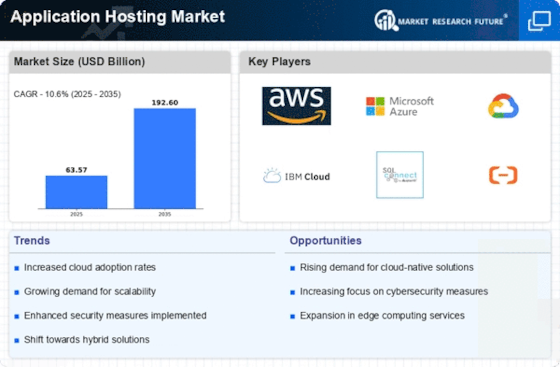Top Industry Leaders in the Application Hosting Market

Competitive Landscape of the Application Hosting Market: 2024 and Beyond
The application hosting market is experiencing explosive growth, fueled by the digital transformation sweeping across industries. Businesses of all sizes are migrating their applications to the cloud, seeking the scalability, agility, and cost efficiency that hosted solutions offer. This dynamic landscape is home to a diverse range of players, each vying for market share with distinct strategies and offerings.
Key Players:
- Amazon Web Services (US)
- Rackspace (US)
- IBM Corporation (US)
- Google LLC (US)
- LiquidWeb (US)
- Microsoft Corporation (US)
- Sungard AS (US)
- DXC Technology (US)
- Spectrum Enterprise (US)
- Apprenda (US)
Strategies for Market Share:
-
Product Differentiation: Players are constantly innovating, developing new features and services catering to specific market segments. AWS's serverless platform Lambda, Azure's AI and machine learning tools, and GCP's containerization expertise are examples of differentiation strategies.
-
Pricing Models: Flexible pricing structures are crucial for attracting and retaining customers. Cloud giants offer pay-as-you-go and committed use discounts, while managed hosting providers tailor plans to specific application needs. New players often compete on aggressive pricing to break into the market.
-
Partnerships and Acquisitions: Strategic partnerships with technology vendors and industry leaders expand reach and access to new client segments. Acquisitions of smaller players with specialized expertise or regional presence are common, enabling consolidation and diversification.
-
Focus on Customer Experience: Delivering exceptional customer support, intuitive interfaces, and automation tools is essential for building brand loyalty. Managed hosting providers excel in this area, offering personalized support and proactive management.
Factors for Market Share Analysis:
-
Revenue and Market Share: This primary metric indicates a player's financial strength and dominance within the market. However, it doesn't always reflect agility or growth potential.
-
Customer Base and Portfolio: The types of customers a provider serves (enterprises, SMBs, startups) and the diversity of applications hosted offer insights into their strengths and target market.
-
Geographic Reach and Infrastructure: Global presence and network infrastructure play a crucial role in attracting geographically dispersed customers and ensuring high availability.
-
Technological Innovation: Continuous investment in research and development, adoption of new technologies like AI and containerization, and development of proprietary tools all contribute to a player's competitive edge.
New and Emerging Companies:
-
Cloudinary: Focuses on image and video management solutions for web and mobile applications.
-
Heroku: A Platform-as-a-Service (PaaS) provider for Ruby on Rails developers.
-
Netlify: Offers a serverless platform for web application deployment and management.
-
Render: Focuses on developer experience with a simple and secure platform for hosting web services.
Current Investment Trends:
-
Hybrid and Multi-Cloud Solutions: Enterprises are increasingly adopting hybrid cloud strategies, using a mix of public and private cloud services. Providers are investing in solutions that facilitate seamless integration and management of diverse cloud environments.
-
Security and Compliance: As data security becomes paramount, providers are enhancing their security offerings and compliance certifications to address customer concerns.
-
Containerization and Serverless Computing: These technologies are gaining traction for their scalability and portability. Providers are investing in tools and platforms that cater to containerized and serverless applications.
-
Edge Computing: Bringing computing closer to the source of data is becoming increasingly important for latency-sensitive applications. Providers are investing in edge computing infrastructure and services.
The application hosting market is a dynamic and ever-evolving space. Understanding the competitive landscape, key players, and their strategies is crucial for businesses navigating this complex environment and choosing the right hosting solution for their needs. As new technologies and trends emerge, the market is poised for continued growth and innovation, offering exciting opportunities for both established players and nimble newcomers.
Latest Company Updates:
AWS acquires CloudHealth: Amazon Web Services (AWS) acquired CloudHealth, a cloud management platform provider, for $1.7 billion. This strengthens AWS's position in the hybrid and multi-cloud application hosting market. (January 12, 2024)
Microsoft Azure partners with SAP: Microsoft Azure and SAP announced a strategic partnership to offer integrated cloud solutions for enterprise applications. (January 5, 2024)
DigitalOcean expands into managed Kubernetes: DigitalOcean, a popular cloud hosting provider, launched its managed Kubernetes service, aiming to cater to developers deploying containerized applications. (December 28, 2023)










